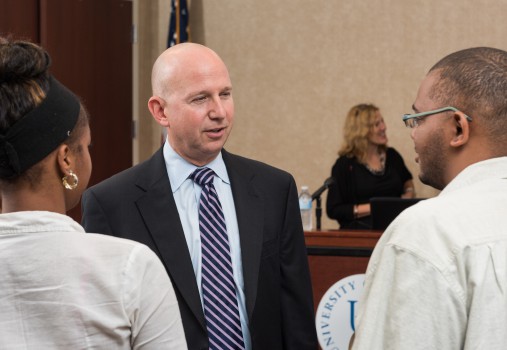Wanted: more job opportunities for people with disabilities
By Brian Freedman
On Oct. 21, the University of Delaware will continue its annual tradition of facilitating Disability Mentoring Day, a national event that encourages people with disabilities to envision their careers and connect with members of the business community. For the second year in a row, UD has collaborated with state leaders, educators and self-advocates to expand the day’s activities. Students and employers from New Castle, Kent and Sussex counties will be participating this year.
While Disability Mentoring Day is certainly meaningful, it is also just one day. Our state has far too many students with disabilities who fail to find a job after finishing high school and college. Many others are never even offered the opportunity to work in the community, instead moving from high school directly into isolated settings with no chance for pursuing career goals. And it seems that the problem is getting worse. According to the U.S. Department of Labor, the labor participation rate of adults with disabilities actually went down between 2013 and 2014, from an already-paltry 17.6 percent to 17.1 percent (meanwhile, the rate went up for adults without disabilities from 64 percent to 64.6 percent). One day of Disability Mentoring Day activities is certainly not enough to solve this seemingly indelible problem.
One of the biggest reasons so many adults with disabilities are not employed is that they never get the chance to hold a job during adolescence or young adulthood. Research shows that paid or unpaid work experience during high school is one of the biggest predictors of future employment for students with disabilities. The opportunity to begin work at an early age promotes confidence and high expectations. It facilitates networking and fosters career development. This makes intuitive sense – most people can point to general skills they learned in a first job, mistakes that were made (and probably never repeated) and an internship that paved the way to getting hired.
Disability Mentoring Day offers a first step. Students with disabilities reflect on and are offered the chance to pursue their career goals. Employers are introduced to an untapped market of potential employees who have a particular interest in their field. Everyone typically ends the day feeling positively about the steps that have been taken and the connections that have been made.
What happens after Disability Mentoring Day then becomes just as critical. Connections between students with disabilities and employers usually will not develop on their own, due to the lack of priority, low expectations and negative stereotypes that are deeply embedded in our society’s general thinking about people with disabilities. Dedicated energy and resources are required to sustain the motivation that everyone feels on Disability Mentoring Day. One recent example of this is new federal legislation called the Workforce Innovation and Opportunity Act. WIOA mandates that states use federal funding to engage high school students with disabilities in career development activities. The University of Delaware’s Center for Disabilities Studies, along with several community providers, began working with the Division of Vocational Rehabilitation last summer to implement WIOA-funded activities and the results have been very positive. We need to continue to capitalize on short-term opportunities like Disability Mentoring Day and long-term opportunities like WIOA to maintain high expectations for students with disabilities and support their pursuit of employment and careers. Through sustained and dedicated effort, we can move the needle on employment and ensure stronger long-term outcomes for people with disabilities.
Categories: accessibility, Center for Disability Studies, Education, employment, inclusion, people with disabilities, Uncategorized
Tags: Disability Mentoring Day, Division of Vocational Rehabilitation, Governor Jack Markell, U.S. Department of Labor, University of Delaware, WIOA, Workforce Innovation and Opportunity Act.



Comments